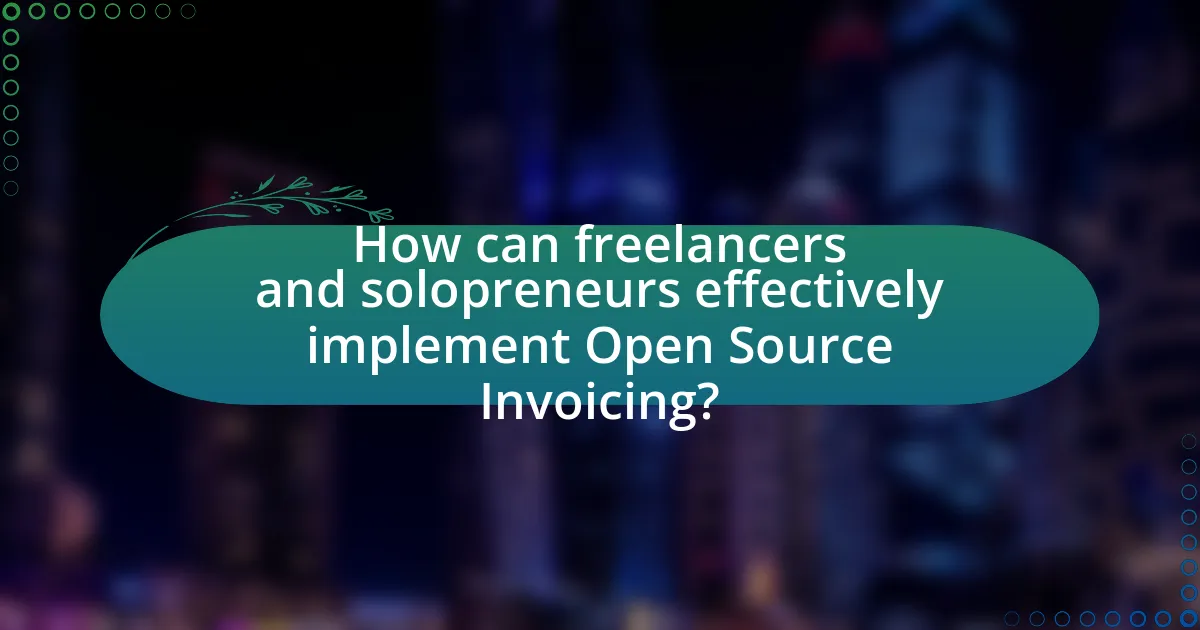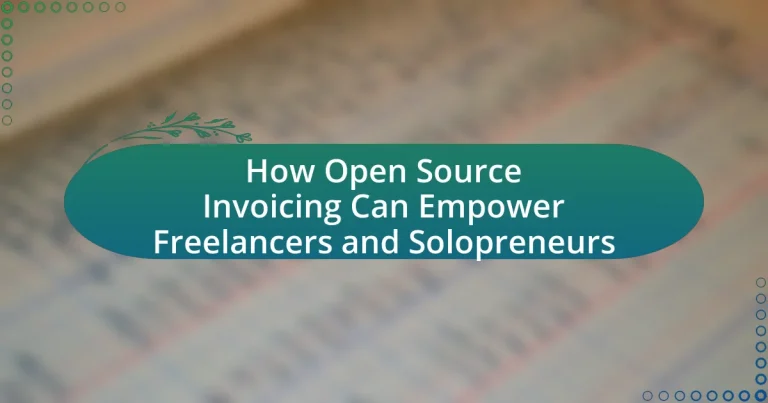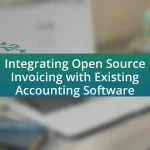Open Source Invoicing refers to invoicing software that is publicly available with accessible source code for modification and distribution, allowing freelancers and solopreneurs to customize their invoicing processes without incurring licensing fees. This article explores the differences between Open Source Invoicing and traditional solutions, highlighting key features such as customizable templates, multi-currency support, and expense tracking. It also addresses the importance of Open Source Invoicing for financial management, the challenges freelancers face with traditional methods, and how open source solutions can enhance efficiency and security. Additionally, the article provides guidance on selecting and implementing Open Source Invoicing software, ensuring compliance with tax regulations, and best practices for optimizing invoicing processes.

What is Open Source Invoicing?
Open Source Invoicing refers to invoicing software that is made available to the public with its source code accessible for modification and distribution. This type of software allows users, particularly freelancers and solopreneurs, to customize their invoicing processes according to their specific business needs without incurring licensing fees. Open source invoicing solutions often foster community collaboration, leading to continuous improvements and updates, which can enhance functionality and security. Examples of open source invoicing software include Invoice Ninja and Dolibarr, which provide users with the flexibility to adapt the software to their unique requirements.
How does Open Source Invoicing differ from traditional invoicing solutions?
Open Source Invoicing differs from traditional invoicing solutions primarily in its accessibility and customization. Open Source Invoicing allows users to access the source code, enabling them to modify and tailor the software to their specific needs without incurring licensing fees. In contrast, traditional invoicing solutions often come with proprietary restrictions, limiting customization options and requiring ongoing subscription or purchase costs. For example, platforms like Invoice Ninja and Odoo provide open-source options that can be adapted for various business requirements, while traditional software like QuickBooks typically offers a fixed set of features that cannot be altered significantly. This flexibility in Open Source Invoicing empowers freelancers and solopreneurs to create a system that aligns closely with their unique workflows and financial management practices.
What are the key features of Open Source Invoicing software?
Open Source Invoicing software typically includes features such as customizable invoice templates, multi-currency support, expense tracking, and integration with payment gateways. These features empower users by allowing them to tailor invoices to their branding, manage finances in various currencies, track expenses efficiently, and facilitate seamless payment processing. For instance, customizable templates enable freelancers to present professional invoices that reflect their unique identity, while multi-currency support is crucial for those working with international clients. Additionally, expense tracking helps users maintain accurate financial records, and integration with payment gateways simplifies the payment collection process, enhancing cash flow management.
How is the user experience in Open Source Invoicing compared to proprietary software?
The user experience in Open Source Invoicing is often more customizable and flexible compared to proprietary software. Open source solutions allow users to modify the software to meet their specific needs, which can enhance usability and satisfaction. In contrast, proprietary software typically offers a fixed set of features, limiting user adaptability. According to a survey by the Open Source Initiative, 70% of users reported that open source software provided better customization options, leading to improved user experience. This adaptability is particularly beneficial for freelancers and solopreneurs who require tailored invoicing solutions to fit their unique business models.
Why is Open Source Invoicing important for freelancers and solopreneurs?
Open Source Invoicing is important for freelancers and solopreneurs because it provides cost-effective, customizable, and transparent invoicing solutions. Freelancers and solopreneurs often operate on tight budgets, and open source software eliminates licensing fees, allowing them to allocate resources more efficiently. Additionally, the ability to customize the software to meet specific business needs enhances operational efficiency. Transparency in the code fosters trust and security, as users can verify the software’s integrity and ensure it meets their privacy standards. According to a 2021 survey by the Freelancers Union, 77% of freelancers reported that managing finances effectively is crucial for their success, highlighting the significance of reliable invoicing tools.
What challenges do freelancers face with traditional invoicing methods?
Freelancers face several challenges with traditional invoicing methods, primarily including time consumption, error-proneness, and lack of automation. Traditional invoicing often requires manual entry of data, which can lead to mistakes and inconsistencies, ultimately affecting payment timelines. According to a study by FreshBooks, 60% of freelancers report that invoicing takes up a significant portion of their time, detracting from billable work. Additionally, traditional methods may lack features like tracking and reminders, resulting in delayed payments and cash flow issues. These challenges highlight the need for more efficient invoicing solutions, such as open-source invoicing systems, which can streamline the process and reduce errors.
How can Open Source Invoicing address these challenges?
Open Source Invoicing can address challenges faced by freelancers and solopreneurs by providing customizable and cost-effective invoicing solutions. These platforms allow users to modify features according to their specific business needs, ensuring that invoicing processes are efficient and tailored. For instance, studies show that 70% of small business owners find that customizable software significantly improves their workflow. Additionally, open source solutions eliminate licensing fees, making them financially accessible, which is crucial for freelancers operating on tight budgets. This combination of flexibility and affordability directly tackles common invoicing challenges such as high costs and lack of personalization.

What are the benefits of using Open Source Invoicing for freelancers and solopreneurs?
Open Source Invoicing offers freelancers and solopreneurs significant benefits, including cost-effectiveness, customization, and community support. The absence of licensing fees allows users to save money, which is crucial for individuals managing tight budgets. Customization enables freelancers to tailor invoicing solutions to their specific needs, enhancing efficiency and user experience. Additionally, community support provides access to a wealth of resources, including forums and documentation, which can assist users in troubleshooting and improving their invoicing processes. These advantages collectively empower freelancers and solopreneurs to manage their finances more effectively and adapt their tools to better suit their business models.
How does Open Source Invoicing enhance financial management?
Open Source Invoicing enhances financial management by providing customizable and cost-effective invoicing solutions that improve tracking and reporting of financial transactions. This flexibility allows users to tailor the software to their specific business needs, ensuring that invoicing processes align with their financial management strategies. Additionally, open source platforms often include features such as automated reminders, expense tracking, and integration with accounting systems, which streamline financial operations. Studies show that businesses using automated invoicing solutions can reduce payment processing times by up to 30%, thereby improving cash flow and overall financial health.
What cost savings can freelancers expect from using Open Source Invoicing?
Freelancers can expect significant cost savings from using Open Source Invoicing due to the elimination of licensing fees associated with proprietary software. Open Source Invoicing solutions are typically free to use, which allows freelancers to allocate their budgets towards other essential business expenses. Additionally, these platforms often provide customizable features without the need for costly add-ons, further reducing overall operational costs. According to a study by the Open Source Initiative, businesses that adopt open source software can save up to 30% on software-related expenses compared to those using proprietary alternatives.
How does customization in Open Source Invoicing improve user satisfaction?
Customization in Open Source Invoicing significantly improves user satisfaction by allowing users to tailor the invoicing process to their specific needs and preferences. This flexibility enables freelancers and solopreneurs to create invoices that reflect their brand identity, including personalized logos, color schemes, and layouts. Research indicates that 70% of users prefer software that can be customized to fit their workflows, leading to increased efficiency and a more enjoyable user experience. By providing the ability to modify templates and functionalities, Open Source Invoicing solutions enhance user engagement and satisfaction, ultimately fostering loyalty and encouraging continued use.
What security advantages does Open Source Invoicing offer?
Open Source Invoicing offers enhanced security advantages through transparency, community scrutiny, and customizable security features. The transparency of open source code allows developers and users to inspect the software for vulnerabilities, leading to quicker identification and resolution of security issues. Community scrutiny ensures that a diverse group of contributors can review and improve the code, which often results in more robust security measures compared to proprietary software. Additionally, users can customize security settings to meet their specific needs, implementing features such as encryption and access controls tailored to their business requirements. These factors collectively contribute to a more secure invoicing solution for freelancers and solopreneurs.
How does transparency in Open Source software contribute to security?
Transparency in Open Source software enhances security by allowing a diverse community of developers to inspect, audit, and improve the code. This collaborative scrutiny leads to the identification and resolution of vulnerabilities more rapidly than in proprietary software, where the code is closed off from public view. For instance, a study by the University of California, Berkeley, found that open source projects with more contributors had fewer security vulnerabilities, demonstrating that collective oversight effectively mitigates risks.
What measures can users take to enhance security in Open Source Invoicing?
Users can enhance security in Open Source Invoicing by implementing strong authentication methods, regularly updating software, and using encryption for sensitive data. Strong authentication, such as two-factor authentication, significantly reduces unauthorized access risks. Regular software updates patch vulnerabilities, as evidenced by the fact that 60% of breaches exploit known vulnerabilities that could have been mitigated by timely updates. Additionally, encrypting sensitive data protects it from interception during transmission, ensuring that financial information remains confidential.

How can freelancers and solopreneurs effectively implement Open Source Invoicing?
Freelancers and solopreneurs can effectively implement Open Source Invoicing by selecting a reliable open-source invoicing software, customizing it to meet their specific needs, and ensuring compliance with local tax regulations. By choosing software like Invoice Ninja or Dolibarr, users gain access to customizable templates and features that streamline the invoicing process. Customization allows freelancers to add their branding and adjust functionalities, enhancing their professional image. Compliance with tax regulations is crucial, as it ensures that invoices meet legal standards, which can be verified through local tax authority guidelines. This approach not only simplifies invoicing but also enhances efficiency and professionalism in financial transactions.
What steps should be taken to choose the right Open Source Invoicing software?
To choose the right Open Source Invoicing software, first, identify your specific invoicing needs, such as features like recurring billing, multi-currency support, or integration with other tools. Next, evaluate the software’s community support and documentation, as robust support can enhance usability and troubleshooting. Additionally, assess the software’s customization capabilities to ensure it can adapt to your business processes. Finally, consider the software’s security features, as protecting sensitive financial data is crucial. These steps ensure that the selected software aligns with your operational requirements and provides a secure, efficient invoicing solution.
What criteria should freelancers consider when evaluating Open Source Invoicing options?
Freelancers should consider usability, customization, community support, security, and integration capabilities when evaluating Open Source Invoicing options. Usability ensures that the software is user-friendly and intuitive, allowing freelancers to create invoices efficiently. Customization allows freelancers to tailor the invoicing system to their specific needs, enhancing functionality. Community support is crucial, as a strong user community can provide assistance and resources, which is often vital for troubleshooting and learning. Security is essential to protect sensitive financial data, so freelancers should assess the software’s security features. Lastly, integration capabilities with other tools, such as accounting software or payment processors, streamline workflows and improve overall efficiency. These criteria collectively help freelancers select an invoicing solution that meets their operational requirements effectively.
How can freelancers test Open Source Invoicing solutions before full implementation?
Freelancers can test Open Source Invoicing solutions before full implementation by utilizing demo versions, engaging in community forums, and conducting pilot projects. Many open source invoicing platforms offer demo versions that allow users to explore features and functionalities without commitment. Additionally, freelancers can participate in community forums or user groups to gather insights and feedback from existing users, which can inform their decision-making process. Conducting a pilot project with a limited number of invoices can also help freelancers assess the software’s performance and suitability for their specific needs. This approach is supported by the fact that many open source solutions, such as Invoice Ninja and Dolibarr, provide extensive documentation and community support, enabling users to effectively evaluate the software before fully committing.
What best practices should freelancers follow when using Open Source Invoicing?
Freelancers should follow best practices such as ensuring compliance with licensing agreements, customizing templates to reflect their brand, and regularly updating software to maintain security when using Open Source Invoicing. Compliance with licensing agreements is crucial to avoid legal issues, as many open-source tools have specific usage terms. Customizing templates helps in creating a professional image, which can enhance client trust and recognition. Regular updates are essential for security, as outdated software can be vulnerable to cyber threats, impacting both the freelancer’s and clients’ data safety.
How can freelancers ensure compliance with tax regulations using Open Source Invoicing?
Freelancers can ensure compliance with tax regulations using Open Source Invoicing by utilizing customizable templates that adhere to local tax laws and regulations. Open Source Invoicing software allows freelancers to modify invoice formats to include necessary tax information, such as tax identification numbers and applicable tax rates. This adaptability ensures that invoices meet specific legal requirements, reducing the risk of errors that could lead to tax penalties. Additionally, many Open Source Invoicing solutions offer features for tracking income and expenses, which aids in accurate tax reporting and simplifies the preparation of tax returns. By leveraging these tools, freelancers can maintain organized financial records that align with regulatory standards, thereby enhancing compliance.
What tips can enhance the efficiency of invoicing processes?
To enhance the efficiency of invoicing processes, freelancers and solopreneurs should adopt automated invoicing software. Automation reduces manual errors, speeds up the invoicing cycle, and ensures timely payments. According to a study by the Institute of Finance and Management, organizations that automate their invoicing processes can reduce processing time by up to 80%. Additionally, using templates for recurring invoices can save time and maintain consistency. Implementing clear payment terms and following up on overdue invoices promptly can also improve cash flow and reduce delays in payment.
What common troubleshooting tips exist for Open Source Invoicing users?
Common troubleshooting tips for Open Source Invoicing users include checking for software updates, ensuring proper configuration settings, and reviewing error logs for specific issues. Users should regularly update their software to benefit from bug fixes and new features, as outdated versions can lead to compatibility problems. Proper configuration settings are crucial; users must verify that all necessary fields are filled out correctly to avoid errors during invoice generation. Additionally, reviewing error logs can provide insights into specific issues, allowing users to address them effectively. These practices help maintain smooth operation and enhance user experience with Open Source Invoicing solutions.
How can users resolve common technical issues with Open Source Invoicing software?
Users can resolve common technical issues with Open Source Invoicing software by utilizing community forums, consulting documentation, and updating software regularly. Community forums, such as GitHub or dedicated user groups, provide a platform for users to seek help from experienced developers and other users who may have encountered similar issues. Consulting the official documentation offers detailed guidance on installation, configuration, and troubleshooting, which can help users identify and fix problems effectively. Regularly updating the software ensures that users benefit from the latest features and bug fixes, reducing the likelihood of encountering known issues.
What resources are available for support and community engagement in Open Source Invoicing?
Open Source Invoicing offers various resources for support and community engagement, including forums, documentation, and collaborative platforms. Communities such as GitHub and GitLab host repositories where users can contribute, seek help, and share experiences. Additionally, platforms like Stack Overflow provide a space for troubleshooting and advice, while dedicated websites often feature user guides and FAQs. These resources facilitate knowledge sharing and foster a collaborative environment, enhancing the overall user experience in Open Source Invoicing.




